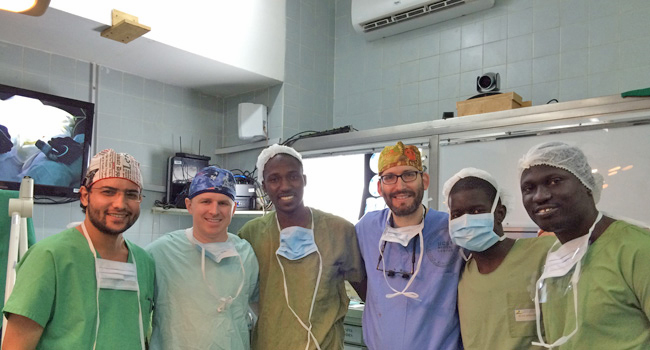Submitted on April 3, 2017

In sub-Sahara Africa, a man with urethral stricture disease (USD) can go a long time without treatment. The condition — in this region most commonly due to sexually transmitted disease or trauma — creates a narrowing of the urethra, which blocks the flow of urine from the bladder. That’s uncomfortable, of course, but it can also lead to urinary tract infections and even kidney damage.
In Senegal, many men with USD rely for years on tubes to drain the bladder because doctors there haven’t been trained in urethroplasty, a procedure that reconstructs the urethra walls. That’s why “it was incredibly gratifying to work with doctors in Dakar to help them develop their skills,” says Dr. Benjamin Breyer, MD, MAS, FACS, an associate professor in residence in UCSF’s Department of Urology and also Chief of Urology at San Francisco General Hospital.
“Teach One, Reach Many”
Breyer, along with reconstruction fellow Greg Murphy and Penn State University urology resident Rosa Park, visited Hospital General De Grand Yoff in Dakar for a week last month. The trip was sponsored by IVUMed, a non-profit organization that brings US urologists to low-resource areas around the world so they can both treat patients and share medical and surgical skills with health professionals.
IVUMed’s motto is “teach one, reach many” and while in Dakar, Breyer and his team gave five lectures and treated nine patients with USD. “It’s a devastating disease in a resource-poor environment,” says Breyer, who is also the director of UCSF’s Male Genitourinary Reconstruction and Trauma Surgery Fellowship. “That’s why it’s rewarding to treat these patients alongside these doctors and know that they will go on to treat still more patients.”
The trip to Senegal is just one of the global health initiatives undertaken by UCSF’s Department of Urology. Annually the department also hosts an African Société Internationale d’Urologie fellow so they can do one year of research at UCSF.
“A Professional and Moral Obligation”
“This kind of outreach and skills sharing is vitally important to our mission as doctors, as a department, and as an institution,” says Peter R. Carroll, MD, MPH Professor and Chair of Urology. “We have a professional and moral obligation to help doctors in impoverished regions develop the skills they need to treat more patients. And it is not a one-way street – working side by side with other urologists, our doctors learn as much as they teach.”
Indeed, the UCSF team came away with a profound respect for the “remarkable job these doctors do with not a lot of resources,” Breyer says. “The surgeons are very crafty and very skilled. It was impressive.”
Breyer was especially struck by the delicate work the surgeons do on women with vesicovaginal fistulas, which occur in the course of prolonged labor – not uncommon in a region with limited access to health facilities. The pressure of the baby’s head on the mother’s pelvic bone can deprive surrounding tissue of blood which in turn creates a “fistula” – or hole — between the woman’s vagina and bladder. As a result, a woman may be rejected by her husband — even her whole community — because of the constant leakage of urine, foul odor, and her inability to have more children.
The condition is almost unheard of in the United States, and Breyer says the work that he witnessed in Dakar was “very sophisticated and amazing to watch.”
“A trip like this puts so many of the conditions that we treat here in the US in perspective,” he adds. “It expands our worldview. There is a level of poverty there that you just don’t see in the United States. It felt very special to use the skills that I worked so hard to develop to heal patients and help other doctors learn the skills they need to heal them as well. Our trip was one of many that the Department supports and nurtures including trips to rural China, South Africa, Guyana, Vietnam, among other places. ”